A National Poetry Month Reading List
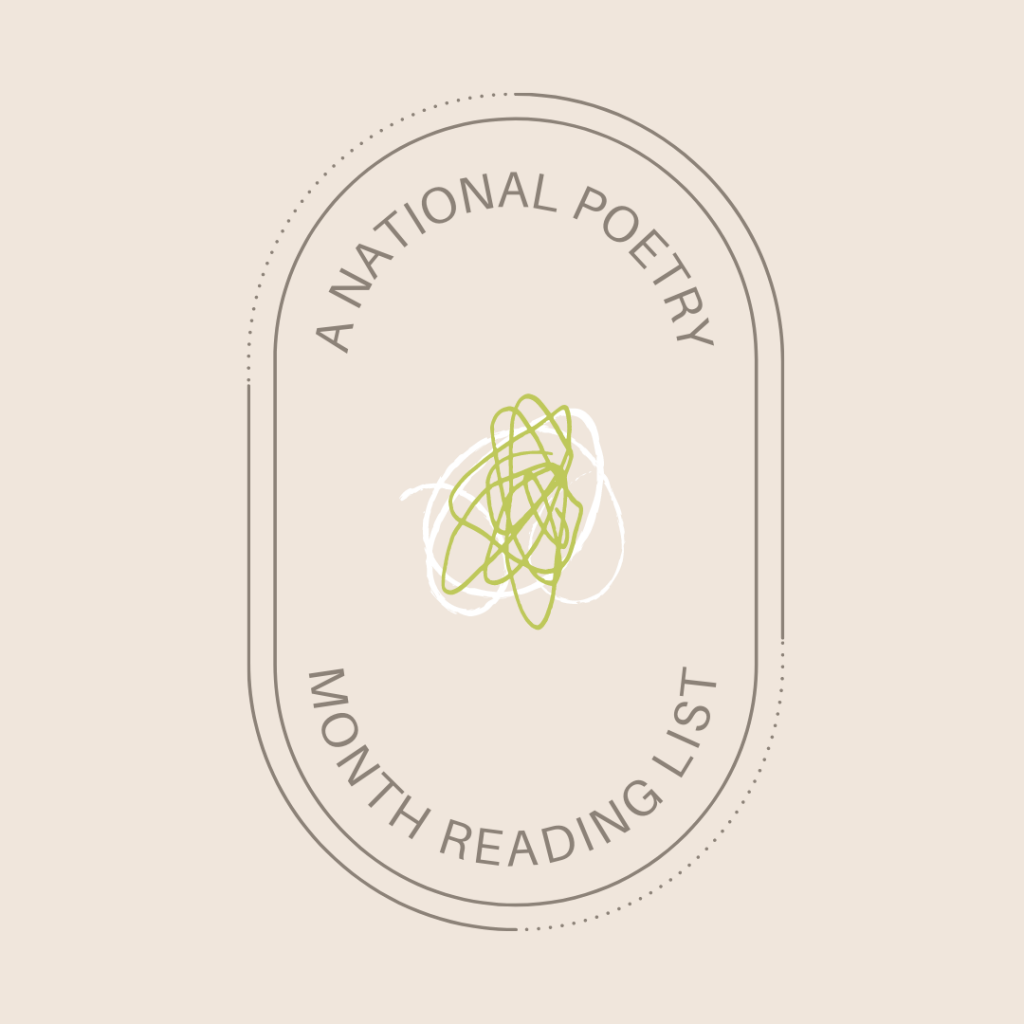
This National Poetry Month, we encourage you to judge a book by its cover. At almost two hundred poetry collections published to date, it’s unsurprising—perhaps even to be expected—that Book*hug books are as enjoyable to look at as they are to read. In celebration of #NPM21, we’ve selected twelve poetry titles that embody this duality, which is a laboured way of saying that the following books will look good on your bookshelf, and even better once you’ve opened and read them. (Funny how that works.)
Happy National Poetry Month everyone!
Set #1
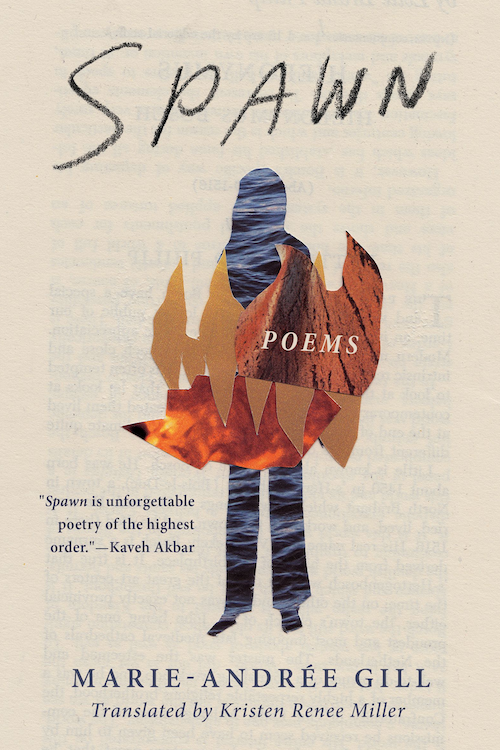
Spawn by Marie-Andreé Gill, Translated by Kristin Renee Miller
Marie-Andreé Gill’s Spawn is a braided collection of brief, untitled poems, a coming-of-age lyric set in the Mashteuiatsh Reserve on the shores of Lake Piekuakami (Lac Saint-Jean) in Québec. The poet’s young avatar reaches new levels on Nintendo, stays up too late online, wakes to her period on class photo day, and carves her lovers’ names into every surface imaginable. Encompassing twenty-first century imperialism, coercive assimilation, and nineties-kid culture, Spawn is threaded with the speaker’s desires, her searching her for her true north: her voice and her identity. Undeniably political, Gill’s poems ask how one can reclaim a narrative that has been confiscated and distorted by colonizers.
“Marie-Andrée Gill’s Spawn is an epic journey that follows the ouananiche in their steadfast ability to hold: rigid, shimmering, hardened to the frigid waters of winter, in all of its capacities of and for whiteness,” writes Joshua Whitehead, award-winning author of Jonny Appleseed. “Here, the land makes love with the narrator and itself to teach honestly what it means to be held, caressed, and cared for in the most intimate of fashions so that the poems can summon into being a spawn of its own wonder-working dreams.”

Gimme yr little quiet by Aisha Sasha John
“If you sift / gather the juices into a line you have a story. / You can put perfume on that line but I’m not / anymore a liar. / I want to smell the armpits of the line / honesty in a body or from your digits / how the unit of a poem is your mouth / the end.”
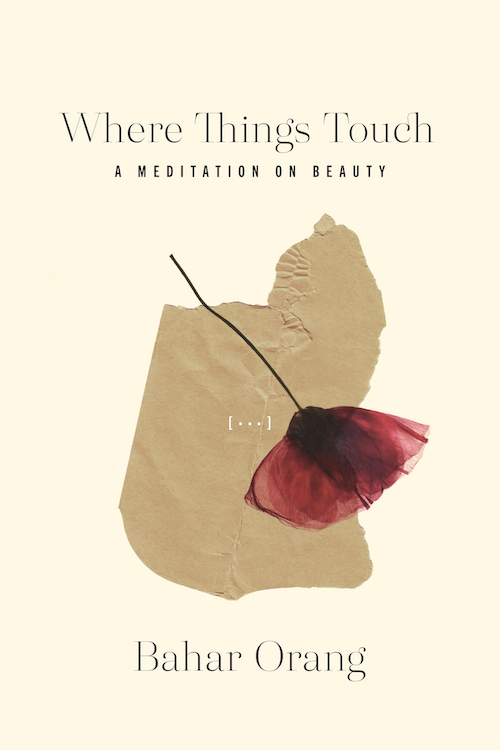
Where Things Touch: A Meditation on Beauty by Bahar Orang
Part lyric essay, part prose poetry, Bahar Orang’s Where Things Touch: A Meditation on Beauty is an exploration of an essential human pleasure. Drawing on her experiences as a physician-in-training, Orang considers clinical encounters and how they relate to the concept of beauty, which is ultimately imagined as something inextricably tied to care: the care of lovers, of patients, of art and literature, and the various non-human worlds that surround us. Orang’s considerations lead her to questions about intimacy, queerness, home, memory, and love.
“Where Things Touch: A Meditation on Beauty is an erotic conversation with the manifold relations of beauty,” writes author and editor Shazia Hafiz Ramji. “Refracted through the lens of caregiving and caretaking, Bahar Orang’s lyric voice roams through poetry, Persian myth, and hospitals to enchant the everyday, returning us to an intimacy beyond the page—back to the body. Orang guides us with heart-centred intelligence in this beautiful and wise book.”
Earlier this week, Where Things Touch was longlisted for the 2021 Gerald Lampert Memorial Award. Congrats Bahar!
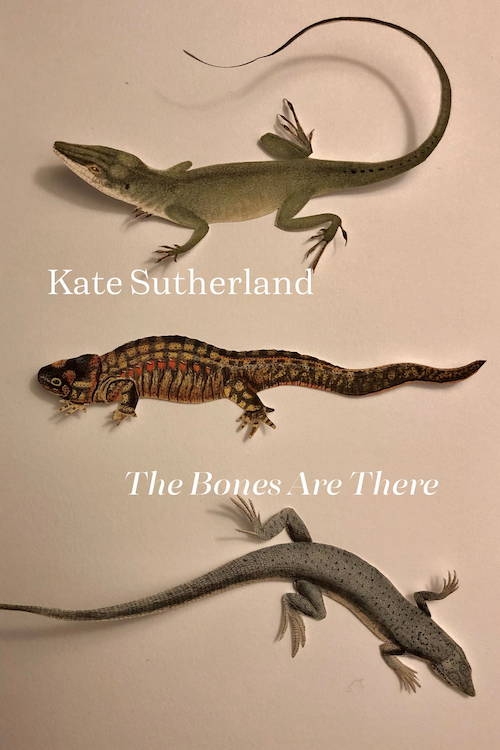
The Bones Are There by Kate Sutherland
Kate Sutherland’s fourth book, The Bones Are There, is poetry by way of collage: pieced-together excerpts from travellers’ journals, ships’ logs, textbooks and manuals, individual testimony, even fairy and folk tales that tell stories of extinction—of various species, and of our own understanding of, and culpability within, its process. Across its three sections, Sutherland draws identifiable connections between various animal extinctions and human legacies of imperialism, colonialism, capitalism, and misogyny, charting the ways in which they juxtapose one another while impacting the natural order of things. As much as it is a critique of humanity’s disastrous effects on this world, The Bones Are There is also a celebration of such incredible creatures, all sadly lost to us. It honours their memory by demanding accountability and encouraging resistance, so that we might stave off future irrevocable loss and preserve what wonders that remain.
“With an archivist’s touch and a lawyer’s eagle eye, Kate Sutherland plunders historic texts to rip colonialism asunder,” writes poet a rawlings, who calls the book “an alarm clocking witness to pasts fraught with loss in the name of discovery and patriarchy.”
Set #2
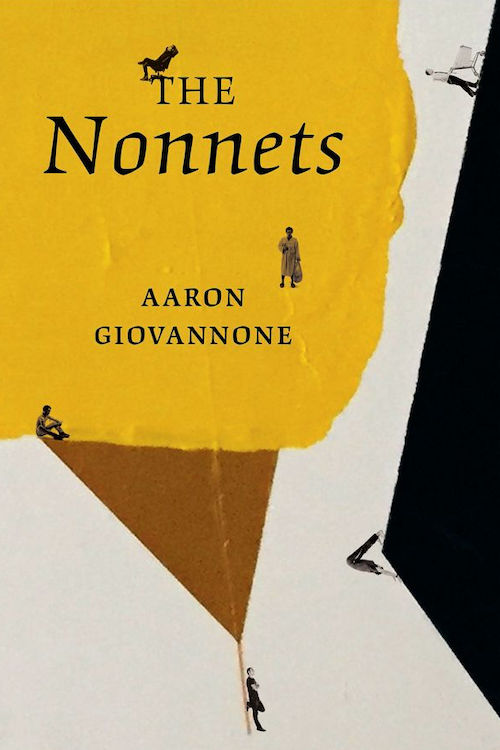
The Nonnets by Aaron Giovannone
Aaron Giovannone’s The Nonnets is a book-length sequence of “nonnets”: nine-line poems that Giovannone handles with ruthless dexterity. Capturing transformations—from mama’s boy to unrepentant shoplifter, from a post-industrial downtown to an eleventh-century Italian monastery—these poems present a kaleidoscopic world that careens wildly between despair and ecstasy. The Nonnets is an utterly unique alchemy of poetry and comedy.
“Often hilarious, always poignant, Aaron Giovannone’s The Nonnets scoop up handfuls of life and buoy them into air,” writes Larissa Lai, author of Iron Goddess of Mercy, The Tiger Flu, and Salt Fish Girl. “These poems are to the heart as angel food cake is to the mouth.” Adam Dickinson, author of The Polymers and a finalist for the Governor General’s Literary Award for Poetry and the Trillium Book Award for Poetry, writes that “[i]f these amazing poems don’t make you think about how wondrous and doomed we are, if they don’t make you laugh and cry, then you are dead inside.”
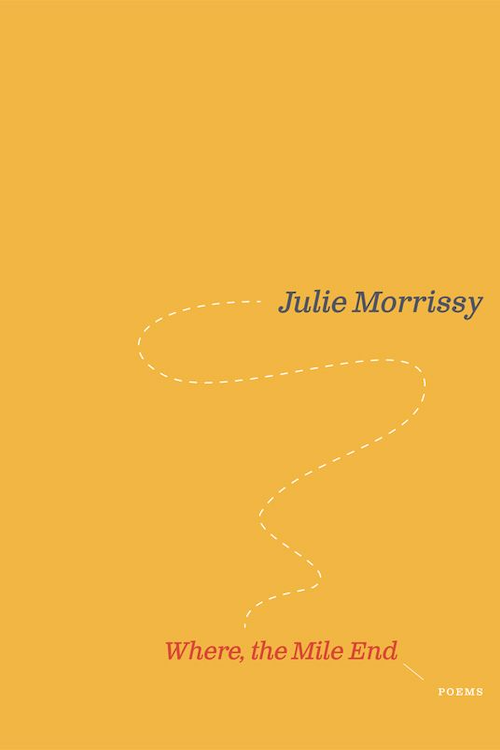
Where, the Mile End by Julie Morrissy
Where, the Mile End—Irish poet Julie Morrissy’s debut collection—embodies an energetic lyricism that whips through Europe and North America with humour, curiosity and a distinct edginess. Morrissy’s lines track emotional, physical, and geographical change, as she intimately links the vitality of two continents: the snow, the streets, the sensual memories. Where, the Mile End reimagines the places we inhabit, the moments we remember, the things we long for.
“Humming with energy and startlingly fresh, these poems crack through the surface of weather and geography and illuminate all that is revealed,” writes award-winning author Jane Urquhart. Terese Svoboda, award-winning author of Weapons Grade and Professor Harriman’s Steam Ship, writes that “Julie Morrissy jauntily leads us down unfamiliar streets, where we often become merrily lost. Brief interludes whip the book forward, as Montreal, San Francisco, and Dublin keep bursting through.”
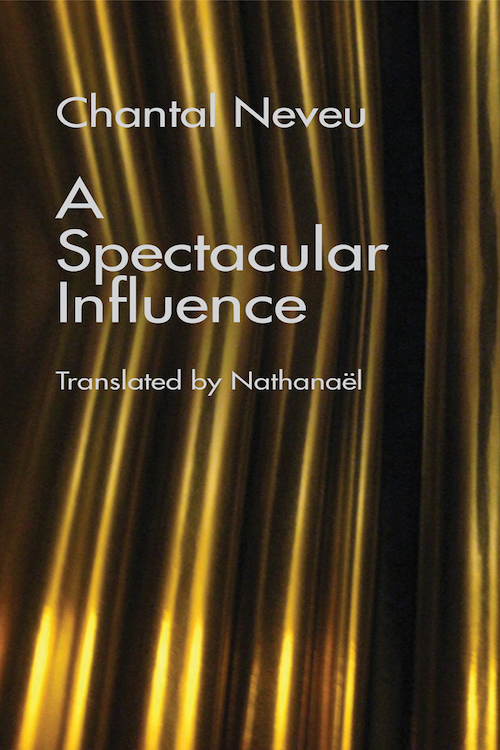
A Spectacular Influence by Chantal Neveu, Translated by Nathanaël
Chantal Neveu’s A Spectacular Influence offers readers an exercise in extreme perception. With clear lines and minimalist language, it holds a linguistic magnifying glass up to core subjects at the foundation of our very humanness. Drawing from philosophy, including pre-Socratic materialists, Nietzsche, and Spinoza, A Spectacular Influence solicits movement in melancholy as a way of celebrating the intimate role that each of us plays in the human collective experience.
“This is poetry, radically,” writes Hugues Corriveau for Le Devoir. In a review for Spirale magazine, Alexis Lussier writes, “In this book, magnificent with density, the most external events are retranslated into intimate events. The writing produces effects of counterpoint that seem to layer several melodic lines tied one to the other. And it is there, in that musical space, that the body is exposed: something arises that changes it, jars it, modulates it, brings about a state or a motion that is the sign of life beating.”
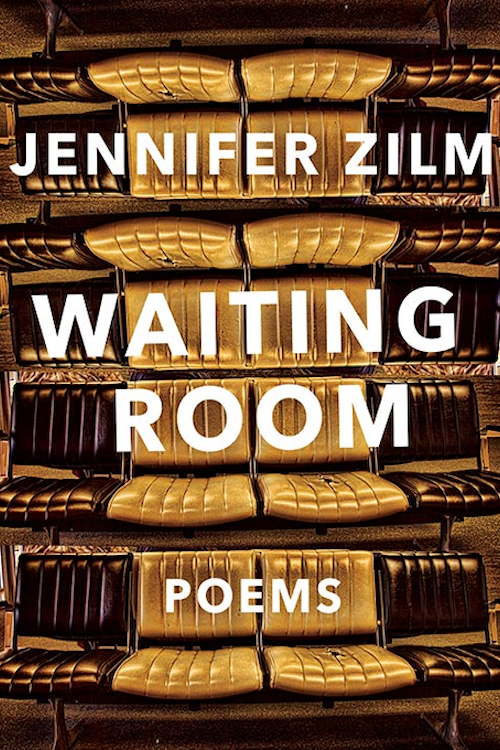
Waiting Room by Jennifer Zilm
Featuring a mélange of styles and forms—sonnets, erasures, unsent emails, footnotes, session notes, CVs, and tweets—Jennifer Zilm’s debut poetry collection, Waiting Room, invites readers to investigate the curious boundaries of various therapeutic terrains. The book is a humorous investigation into what it means to wait, to be a patient and to be patient, to be a student and to be a teacher, to be a healer and to be healed.
“Zilm’s first collection of poetry is a layered experience; intelligent, stimulating, structurally precise, shot through with a slightly sardonic (but not embittered) sense of humour. Ranging from the language of the Dead Sea Scrolls to the language of Psychiatry (its own kind of religion), Zilm pushes text and textuality, exploring art, life, theory and mortality,” writes author Hiromi Goto. “What a virtuoso performance.” Wayde Compton, author of The Outer Harbour, writes that “Zilm’s poetic lyrics are pocket epics.”
Set #3
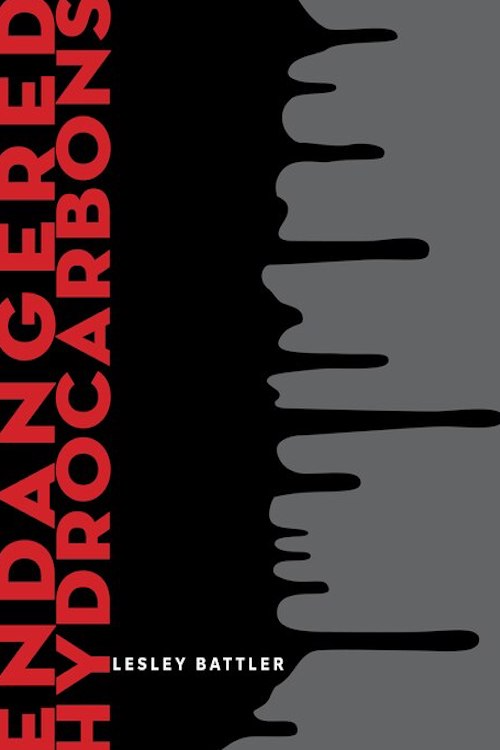
Endangered Hydrocarbons by Lesley Battler
Endangered Hydrocarbons, Lesley Battler’s debut poetry collection, shows that the language of hydrocarbon extraction—with its blend of sexual imagery, archetype, science, pseudoscience, and the purely speculative—can be as addictive as the resource it pursues. Using pastiche and wordplay, Battler shines a floodlight on the absurdity and pervasiveness of production language in all areas of human life in the oil fields, including art, culture, and politics. She deliberately tampers with her sources—video games, home decor magazines, works by Henry James and Carl Jung, and texts generated by a multinational oil company—to emulate extraction processes used by the industry: excavating, mixing, and drilling. This is the language of our oil-addicted 21st-century society.
Author Tom Wayman calls Endangered Hydrocarbons “a high-octane romp through Alberta’s oil patch,” and “a tour from office tower cubicles to bitumen sands extraction sites.” In a review for Arc Poetry Magazine, Anita Lahey calls the book “[e]lectric and unexpected.”
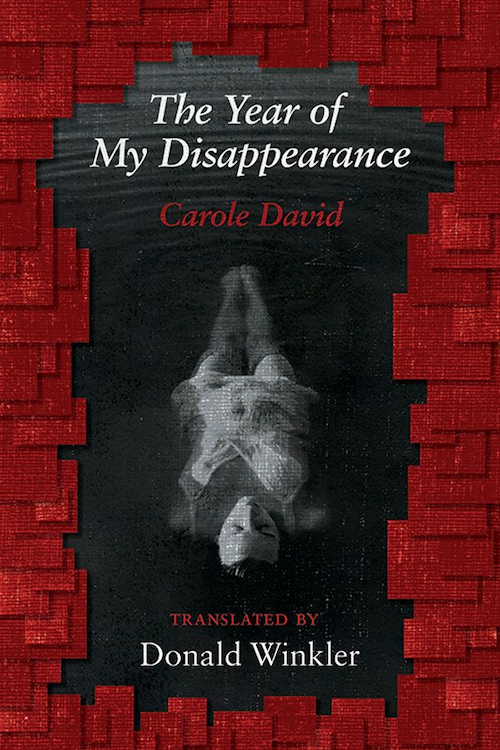
The Year of My Disappearance by Carole David, Translated by Donald Winkler
Carole David’s The Year of My Disappearance is a searing, surreal, darkly comic descent into a woman’s psyche. Present here are figures lodged in the woman’s memory: lovers, strangers, her mother, and Bosch-like apparitions out of her dreams and imaginings. Through it all, a fierce combat is being waged between immolation and survival. Translated from the French by award-winning translator Donald Winkler, The Year of My Disappearance is a pitiless assault on the author’s own torments and pretenses. As David writes, “I gave free range to the lives that dwelt within me.”
“This sharp-witted poetry, knife blades at the ready, speaks of the landscape a woman may come to inhabit who is undone, overwhelmed by the violence to which any life is subject when weighed down by remembrances,” writes Hugues Corriveau for Le Devoir. In a review for Canthius, Frances Boyle writes that “Winkler’s translation beautifully evokes the interplay of the surreal, dread and dark humour in David’s work.”
The Year of My Disappearance was awarded the 2016 Prix des Libraires and the 2016 Quebecor Prize for the Trois-Rivières Poetry Festival.
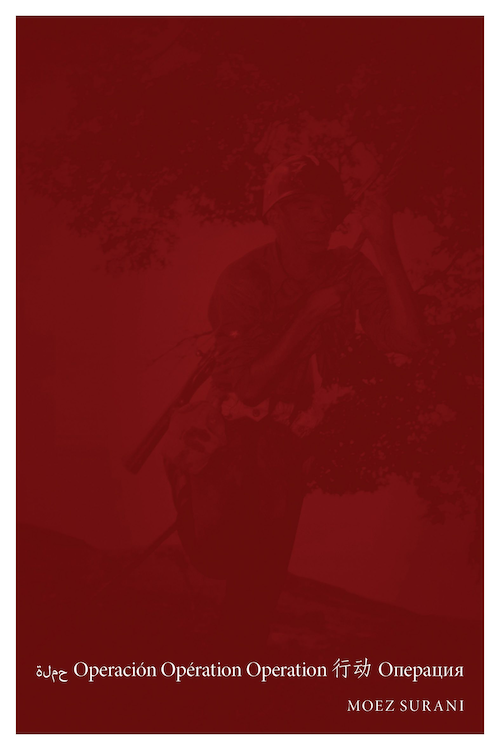
ةيلمع Operación Opération Operation 行 动 Oперация by Moez Surani
Moez Surani’s ةيلمع Operación Opération Operation 行 动 Oперация is a book-length poetic inventory of contemporary rhetoric of violence and aggression, as depicted through the evolution of the language used to name the many military operations conducted by UN Member Nations since the organization’s inception in 1945. By pulling military language away from euphemism, making it account for its double-speaking ways, the book gives voice to the many lives lost in conflicts around the world. Surani shows that no word is free from connoting violence: where “tulip” and “grasshopper” are equal to “killer” and “bone breaker,” no word is inherently innocent, beautiful, or good.
“Racking up four thousand military operations by United Nations member states since 1945, Moez Surani’s list is far from simple,” writes Jed Rasula, author of Destruction Was My Beatrice: Dada and the Unmaking of the Twentieth Century. “Who knew that the UN was writing a long poem? Or that this particular long poem would resound in the mind like Pound’s Cantos, that ‘poem including history’? A stunning compilation of linguistic fertility—and fertilization—courtesy of a political organization listing in the wind over half a century.” Author Charles Bernstein writes that “Moez Surani has written a new kind of elegy.”
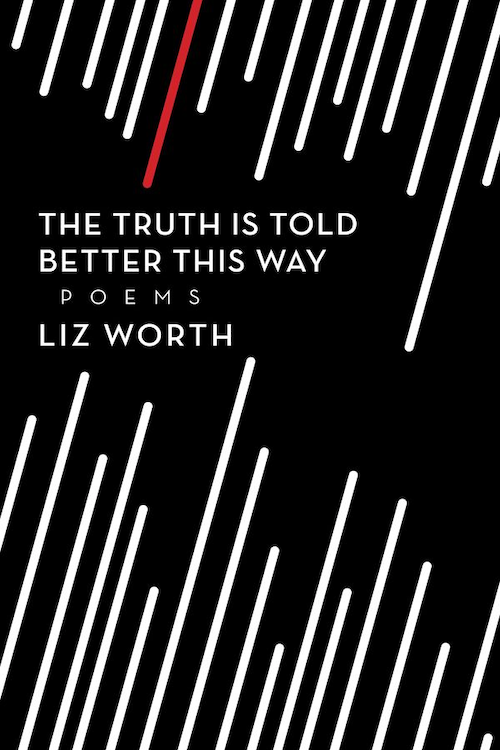
The Truth Is Told Better This Way by Liz Worth
Pulling from raw themes of grief and death, regret and discomfort, sadness and failure, Liz Worth wears the poems in The Truth Is Told Better This Way down to their bones. The book unravels its secrets one at a time, straddling dreamy, ethereal images and brutal honesty. The result is oracular and surreal, as much a magic spell as it is a poem.
“Told with a wink and a sly smile, Worth’s deliciously dark and defiant poetry crawls under one’s skin and stays there,” writes Heather Babcock, author of Of Being Underground and Moving Backwards. “Like an unforgotten lover whom you just can’t shake, the poems in this collection will keep you up at night.” Author dalton derkson writes that “Liz Worth has never been darker.”
The Truth Is Told Better This Way is a finalist for the 2018 ReLit Award for Poetry. Congrats Liz!

